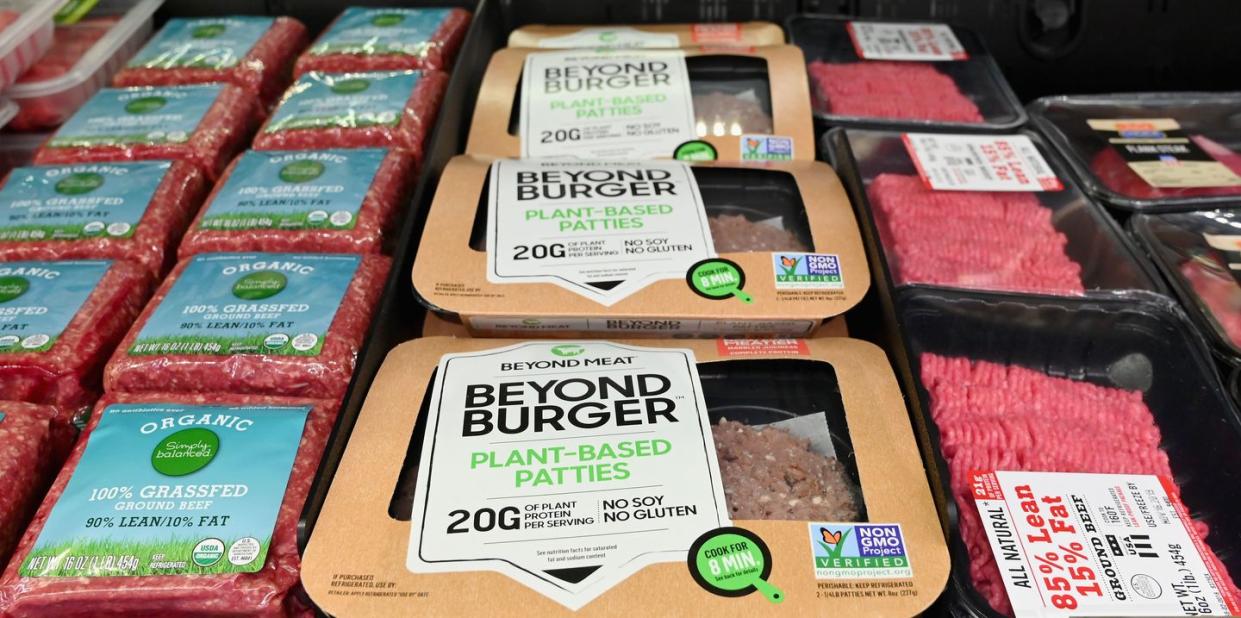When It Comes To Plant-Based Meats, Vegan Doesn't Always Mean Healthy

Yesterday was a rather odd Thursday afternoon for me. I was on the hunt to find the best tasting plant-based meat alternatives on the market. After about an hour, my apartment smelled surprisingly meaty, something I didn't expect from so many meatless products, and my stomach was full. I tasted every kind of plant-based chicken, ground beef, and sausage I could find and some were great, others, not so much. My kitchen was littered in the carcasses of these products—cardboard boxes and plastic sleeves were all over my kitchen table. And then I started looking over the nutritional labels of these "meats."
When I think of following a vegan diet, I almost always assume it will be healthier. After all, if you can't eat animal products, the whole foods you can consume are fruits, veggies, beans, nuts, etc. But things like Oreos, Pringles, Sour Patch Kids, and Takis are vegan too. After a particularly scarring taste of a plant-based ground beef that tasted like synthetic tire, I wondered if these substitutes were any healthier than actual meat. I mean, one reason many people go vegan is for health reasons, right?
On a deeper glance at the nutritional labels, I saw ingredients like soy protein concentrate, sunflower oil, coconut oil, pea protein, potato starch, apple extract, cocoa butter, methylcelluose, soy leghemoglobin, and some long words I can't pronounce. Is all that healthy? Or healthier?
Luckily, the University of Minnesota has answered this question. Researchers from the School of Public Health wanted to learn whether ground beef or its plant-based alternatives are healthier. They took 37 plant-based ground beef alternative products made by nine companies and compared their nutritional value to ground beef.
"It's a mixed bag," says Lisa Harnack, a professor and lead author of the study. "Plant-based ground beef alternative products tend to be a good source of nutrients like folate, fiber, and iron. And most of the products were found to contain substantially lower amounts of saturated fat in comparison to ground beef."
What they lacked, however, was protein, zinc, and vitamin B12. "Vitamin B12 is only found in animal products," Harnack adds. "Beef is a big source of vitamin B12 in the American diet." And compared to ground beef, a lot of the products were also high in sodium, something most Americans already consume too much of.
Here's the good news. Because of the way they are developed, the formulations of these plant-based products could be changed to help include the nutrients they are lacking—like being fortified with B12—and to lower the sodium levels. As you are shopping, just make sure to read the nutrition label on the back and make sure it aligns with your health needs.
The plant-based meat alternatives market isn't going away anytime, and for people who want to eat a diet with less animal products, these products are a great way to do it. Because seriously, some of them are really good. And science is finding a way to turn the most impossible of animal products into something plant-based. We can only hope that they will taste good and be healthy.
You Might Also Like

